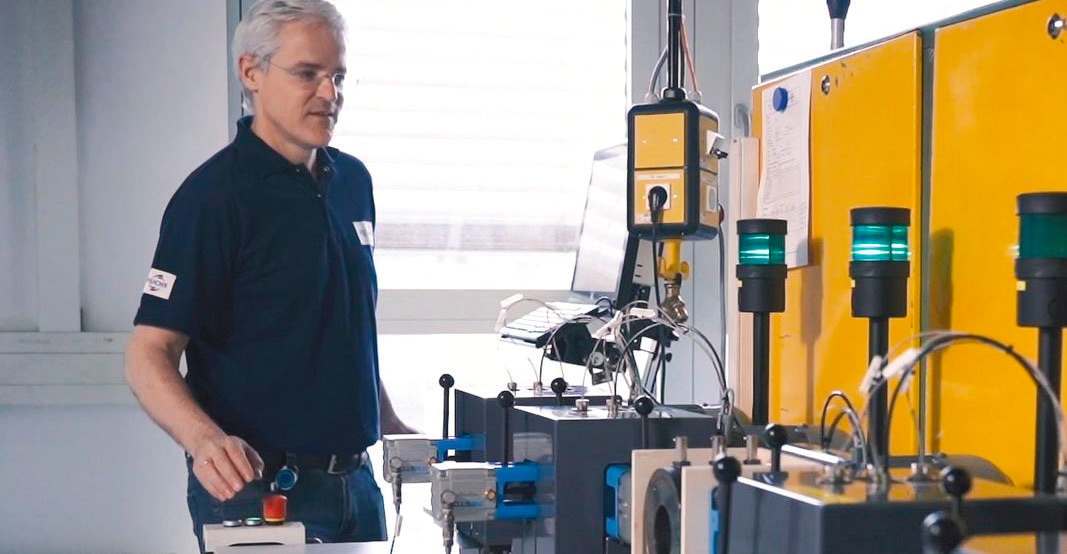TLT: How long have you worked in a lubrication-related field, and how did you decide to pursue a career in the lubricants industry?
Litters: I have been working on the development of lubricating greases at Fuchs Lubricants for more than 26 years. At first I did not think I would deal with this topic for so long, but after a short time, I was so fascinated by the incredible variety of lubricating greases and related subjects that I have not gotten away from it to this day. As with many other colleagues, my entry into this industry was more or less by chance, because when I was about to go to college, there was no targeted university education for tribologists and lubrication experts here in Germany. Fortunately, things are better nowadays. Many younger researchers and developers are excellently trained in this field, and some are working at Fuchs now.
TLT: What has been your most rewarding accomplishment throughout your career in the lubricants industry?
Litters: It is difficult for me to emphasize my own contribution because many of the successes we have achieved at Fuchs are based on the interdisciplinary cooperation between many colleagues. Without close cooperation between lubricant chemists and tribologists, test field engineers and users, it would not be possible to understand the complexity of grease-lubricated tribological systems and to develop suitable product solutions. Maybe I was just lucky to have been able to work in a very good network of colleagues for many years and to be in regular contact with customers and researchers.
TLT: What is the No. 1 piece of advice you would give to a person who might be interested in starting a career in the lubricants industry?
Litters: You should be prepared to think far beyond the actual lubricant chemistry and be interested in related topics such as engineering and material science. And don’t hesitate to raise questions when you feel that you didn’t get the problem. That’s why choosing the right employer also is very important. In order to successfully develop, produce or market industrial lubricants, you need an experienced team of experts from a wide variety of disciplines. Chemists, physicists, engineers and businesspeople have to work hand in hand. In addition, you need a globally well-established, modern technical infrastructure that extends from the laboratory to production. Therefore, you should try to start an appropriate professional career in one of these companies. I am very happy with my career at Fuchs.

Thomas Litters working on a grease life bearing test rig.
TLT: Throughout the different segments within your career, which one has been the most interesting, challenging and/or rewarding?
Litters: The most exciting is what I am doing today—the development of new lubricating greases for e-mobility vehicles. Especially in greased roller bearings for electric drive motors, harmful motor currents make it difficult for the lubricating grease to protect bearings from wear and premature failure. This is where chemistry, tribology and rheology meet electro-physics, and this is where the lubricant developer has the most to learn because he has had little to do with it up until now. How does an electromagnetic field affect the lubricant and vice versa? How do damaging electrical discharges occur when different tribocontacts and transition resistances are formed depending on the lubricant and operating conditions? These are very valid questions, and so lubricant manufacturers and users are just beginning to understand the complexity of the subject. A positive sign is that a cross-sector collaboration in the form of publicly sponsored research projects and standardization committees has emerged in this area, which will lead to further improvement of e-vehicle efficiency in the future.
TLT: What are some of the most technical lubrication-based concepts or topics that you have encountered throughout your career?
Litters: A very positive trend is that more and more researchers are searching biogenic raw materials for lubricants. There are interesting studies on the use of various biopolymers as thickeners or additives in lubricating greases. We also have made contributions to this in recent years by developing new driveshaft greases based on such materials. I think there will be some surprising developments here in the next few years, driven by the goal of global climate neutrality.
I’m also impressed by the new knowledge gained over the past two decades regarding the rheology of lubricating greases. Today, it is better than ever to visualize the structures of lubricating grease using high-resolution imaging methods such as atomic force microscopy. At the same time, high-resolution computer-controlled air-bearing rotary rheometers allow the viscoelastic behavior of lubricating greases to be investigated in a comparatively practical manner. Both help to accelerate industrial product development. Fortunately, the current public research is increasingly concerned with the fluid dynamics of lubricating greases, e.g., in roller bearings. So, I am curious to see which simulation models will be developed in the near future and how we can apply them in the lubricants industry.
TLT: What is the one thing you wish you would have learned earlier in your career?
Litters: From today’s perspective and after many years in the lubricants industry, it would not have hurt me if I had already learned more about tribology during my technical education, particularly about the special features of rolling bearings, which I still consider to be the most fascinating grease-lubricated tribosystem. It would certainly have helped me if, in the past, I also had dealt with other lubricants, such as metalworking fluids or oil lubrication, in addition to lubricating greases, or had been able to work in application technology—because then one would have a much broader understanding of the most diverse aspects developed in tribology. That is why Fuchs, with its wide variety of lubricants, has brought me such great opportunities.
You can reach Thomas Litters at thomas.litters@fuchs.com.